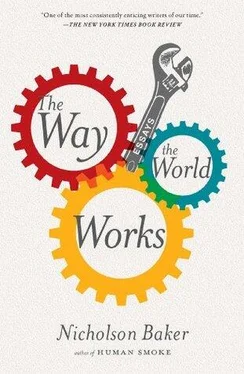So, inspired by the library’s own letterhead, which reads: “Access, Discover, Empower,” I sued for legal access. On June 26, 1996, eighteen drawers from the old card catalog were brought over to the new building, where I was allowed to use them. Meanwhile, the San Francisco Board of Supervisors proposed and passed a nonbinding resolution “urging the Library Commission to preserve the card catalog at the Main Library and make it available to the public.” On September 3, 1996, after hours of public testimony, the Library Commission voted to find a way to keep it.
But by the time I was successfully looking up names like Walter Benjamin, John Milton, and J. K. Huysmans on paper cards — and noticing that there were substantially fewer books in the online catalog by these writers than there were in the card catalog — I had spent over a month talking to members of the library staff. I knew the real story, which is only incidentally about catalogs.
The real story is about what happens — what to a greater or lesser degree is happening in a number of cities around the country — when telecommunications enthusiasts take over big old research libraries and attempt to remake them, with corporate help, as high-traffic showplaces for information technology. Such transformations consume unforecastably large sums of money, which is why the SFPL found itself, just then — despite receiving a goodly percentage of the city budget every year as part of Proposition E’s “Preserving Libraries Fund”—essentially broke, with a one-million-dollar deficit in its operating budget, its new building annotated and beflagged with the names of major benefactors who enabled it, just barely, to open its doors in April.
One of these benefactors is the Pacific Telesis Group (parent to Pacific Bell, the phone company), a corporation that wants to become a “content provider” in the growing fee-for-service information business. Steven Coulter, a vice president at Pacific Telesis, is the president of the Library Commission; he is a proponent of the virtues of informational connectivity and public-private partnerships, and he is a masterful fund-raiser for the library. Kenneth Dowlin, the city librarian — hired away from Colorado Springs, where, as the head of the Pikes Peak Library District, he developed an early dial-up-access catalog called Maggie’s Place — also wants SFPL to become a sort of telecommunications utility: he told members of the American Library Association in 1992 that he envisions the library offering “electronic access to each home, school, and office by the year 2000,” and added, “We intend to generate revenue off of this pipeline.” He also said, “I will let the planning department ship documents for building permits over my system, but I get my five percent.”
The pipeline metaphor is a useful one, and it exerts an understandably powerful hold on the minds of many library managers these days, as everyone, in and out of the stacks, tries to figure out who gets to adjust the valves and calibrate the pressure gauges, and who will have the privilege of setting tariffs on the ideational flow. Last year, the entrepreneurial SFPL launched Library Express, a service that charged sixty dollars an hour to clients who needed, and could afford, a higher level of research assistance and document retrieval than the unpaying patron.
Not all observers like the privatizing tendencies in the public-library world, but it would be mere churlishness to point out the shortcomings of this self-proclaimed “library of the future,” the outcome of so extraordinary an outpouring of civic spirit and generosity, were it not for one thing: under Dowlin and his A-team (as he calls his cadre of chiefs and special assistants), the SFPL has, by a conservative estimate, sent more than two hundred thousand books to a landfill — many of them old, hard to find, out of print, and valuable.
“I’m sure that at least that many are gone,” one librarian told me. “I would guess that maybe a quarter of them, fifty thousand, should have been thrown out. But I would guess that at least a hundred thousand shouldn’t have been. And another fifty thousand that I just can’t guess. . I personally saw at least twenty or thirty thousand books when we were still in the old building that were boxed up and never made it back into the collection.” This man, like most of the staff members I talked to, doesn’t want me to quote him by name, since Dowlin has a way, some assert, of punishing dissidents by exiling them to branch duty (a charge the administration has denied). What the employees wanted me to know was that the library was undergoing a kind of brain surgery. In the words of one woman I interviewed, “Its EEG is going flat.”
The worst period of book dumping happened late last year, in the months before the library’s move to the New Main, as it is called — a large gray structure with a hole in the middle where the stacks should be. The construction was financed with more than a hundred million dollars in public money; the voters approved this munificent bond issue because the Old Main, they were told, couldn’t hold what it was being asked to hold — a research-level general collection, thousands of specialized periodicals, the Grabhorn Collection on the History of Printing and the Development of the Book, the Schmulowitz Collection of Wit and Humor, city archives, newspaper archives, photo archives, and so on. When appeals went out for money to furnish and outfit the new building, more than thirty million dollars flowed in from private donors and “affinity groups,” representing gays and lesbians, several ethnic communities, and environmentalists.
From the outside, the building looks enormous — and inside, too, the visitor can enjoy sweeping expanses of carpeting, vistas of distant gift shops and security checkpoints, multi-story works of public art, the Chevron Corporation Teen Center, the BankAmerica Foundation Jobs and Careers Center, and uninterrupted sight lines in almost every direction. Throw back your head, and you stare upward through a “glittering void” (as its principal architect, James Ingo Freed, describes it) that extends to a conical cornea of white glass eighty-six feet above you. But space, from the point of view of an existing collection of books, means something quite different from floor space, or atrium space, or bandwidth in a telecommunications cable, all of which the New Main has in relative abundance. Space, to a book, means shelves: the departments of the library were supposed to get enough shelves to hold their collections, with plenty of room to grow. And yet most of the departments still do not have enough shelf space to hold what they have.
Even before the influx of hundreds of thousands of new books, bought with Proposition E money, some staff members had serious doubts about the building’s capacity. In 1991, when the administration passed around plans for the New Main, thirty-one library employees signed a letter contending that “of the 375,000 square feet promised, much of it will be all but useless. . Obviously the current plan for the new building is not meeting the needs set forth to voters to justify the expenditure.” But the gravity of the problem only began to dawn on the A-team late in 1995, when individual librarians began mapping potential book arrangements prior to the move. Tape measures came out, calculators were turned on, rules of thumb were invoked. Suddenly it was abundantly clear: the collection in the Old Main Library was not going to fit in the New Main Library. Kathy Page, chief of the Main, wrote in Progress Report No. 34, dated December 1995, “Several surprises and errors were discovered that are proceeding to be solved or mitigated.” How were the errors solved or mitigated? The collection itself was hastily reduced in volume. It was “weeded.”
Читать дальше












